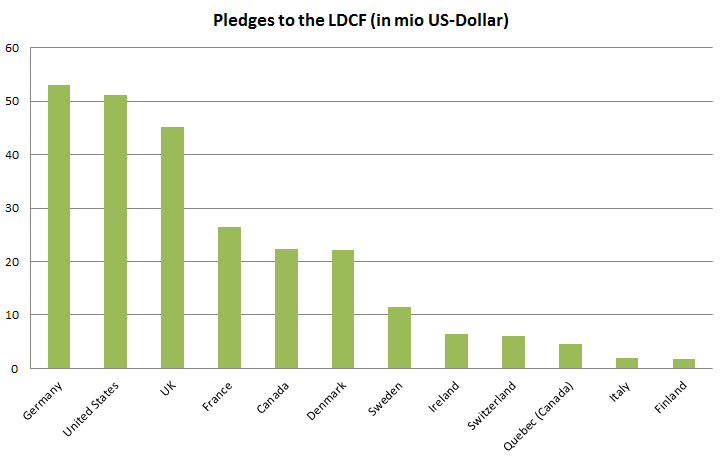International climate finance
A cash injection for the Least Developed Countries Fund (LDCF)

The new pledges to the LDCF are good news, but will not solve its funding problems. Source: Boehling/ Diakonie Katastrophenhilfe
The speeches by Barack Obama, Angela Merkel and many others of the nearly 150 heads of state and government dominated the headlines on the first day of the 21st conference of the United Nations Framework Convention on Climate Change (COP21). While they were addressing the main assembly hall, money was on the agenda in the small adjoining room.
The Global Environment Facility (GEF) had called the meeting, and a number of representatives of industrialized countries had taken up the invitation. It has been known for some time that the GEF, which manages the Least Developed Countries Fund (LDCF) for adaptation measures in the most vulnerable countries, is experiencing a financing shortfall. As in the main hall, country representatives took the stage one by one, but instead of vague generalities, they delivered concrete numbers: Overall, the ten country representatives announced pledges totaling $250 million. Germany took the lead with $53 million, followed closely by the United States ($51.175 million) and the United Kingdom ($45.1 million). COP21 host France committed to a donation of $26.5 million, slightly more than Canada ($22.4 million) and Denmark ($22.1 million). Sweden pledged $11.5 million, followed by Ireland ($6.4 million), Switzerland ($6 million), Italy ($2 million) and Finland ($1.8 million).
In addition to that, several days later a different kind of financial commitment was announced: The Canadian province government of Quebec pledged $4.49 million to the LDCF. This is the first significant pledge of a subnational actor to a multilateral climate fund which could set an example changing the donor basis in future.
The new financial commitments clear the way for the implementation of around 35 new projects that have been technically approved for some time. While this appears to be good news, the pledges will hardly solve the challenging situation faced by adaptation funding. Not only is a series of further LDCF projects currently being developed that will depend on ad hoc pledges for their implementation – from a broader political perspective, long-term, predictable sources of finance for adaptation are urgently needed. In addition to short-term financial commitments, a number of other decisions on issues such as financial support in the period after 2020 and the future of the Adaptation Fund must be reached in Paris.
Lisa Junghans / Germanwatch





